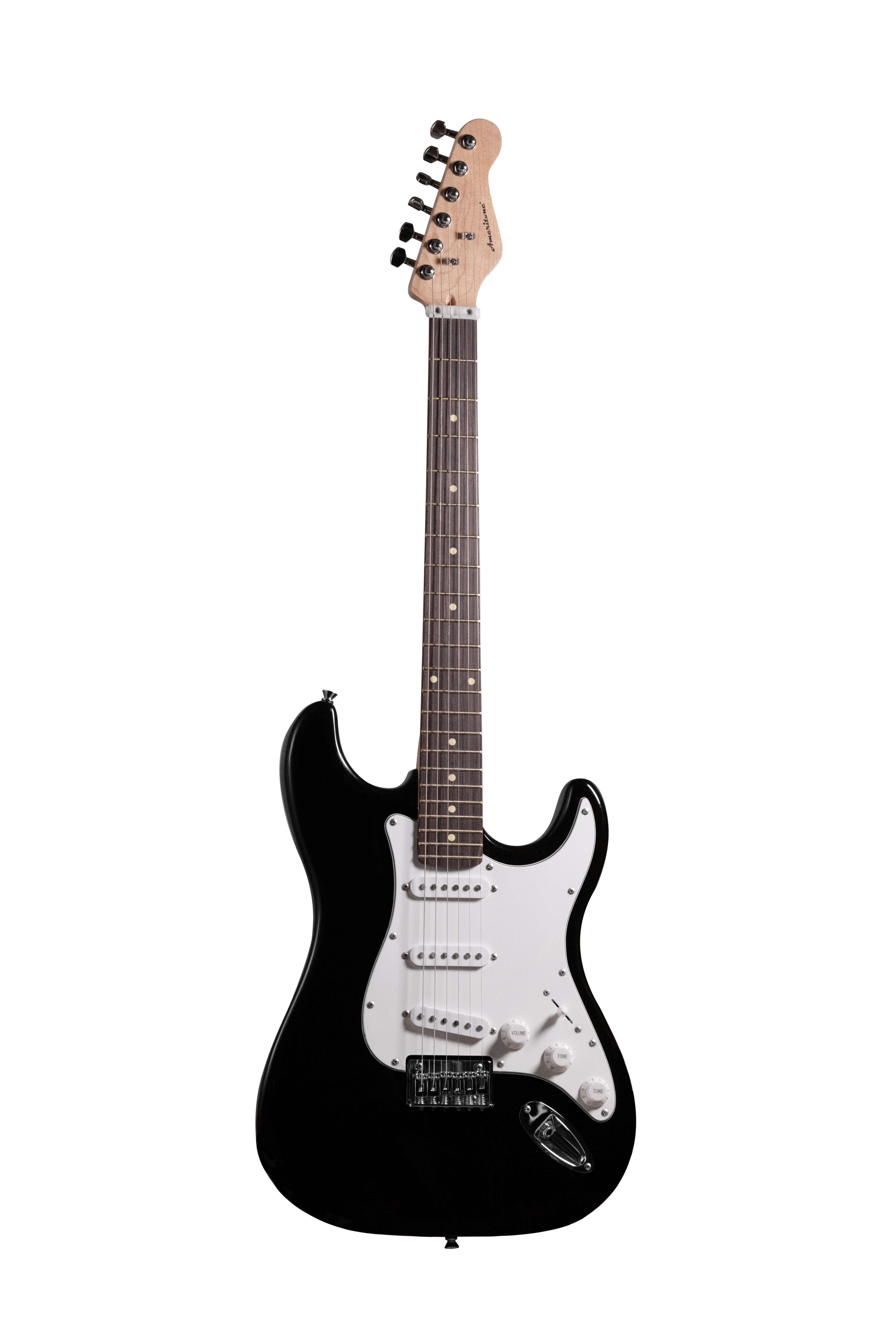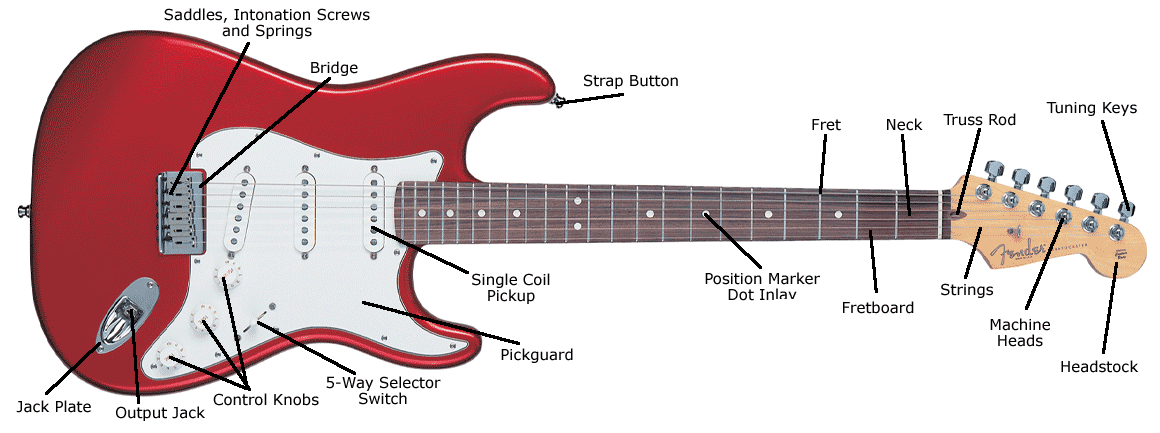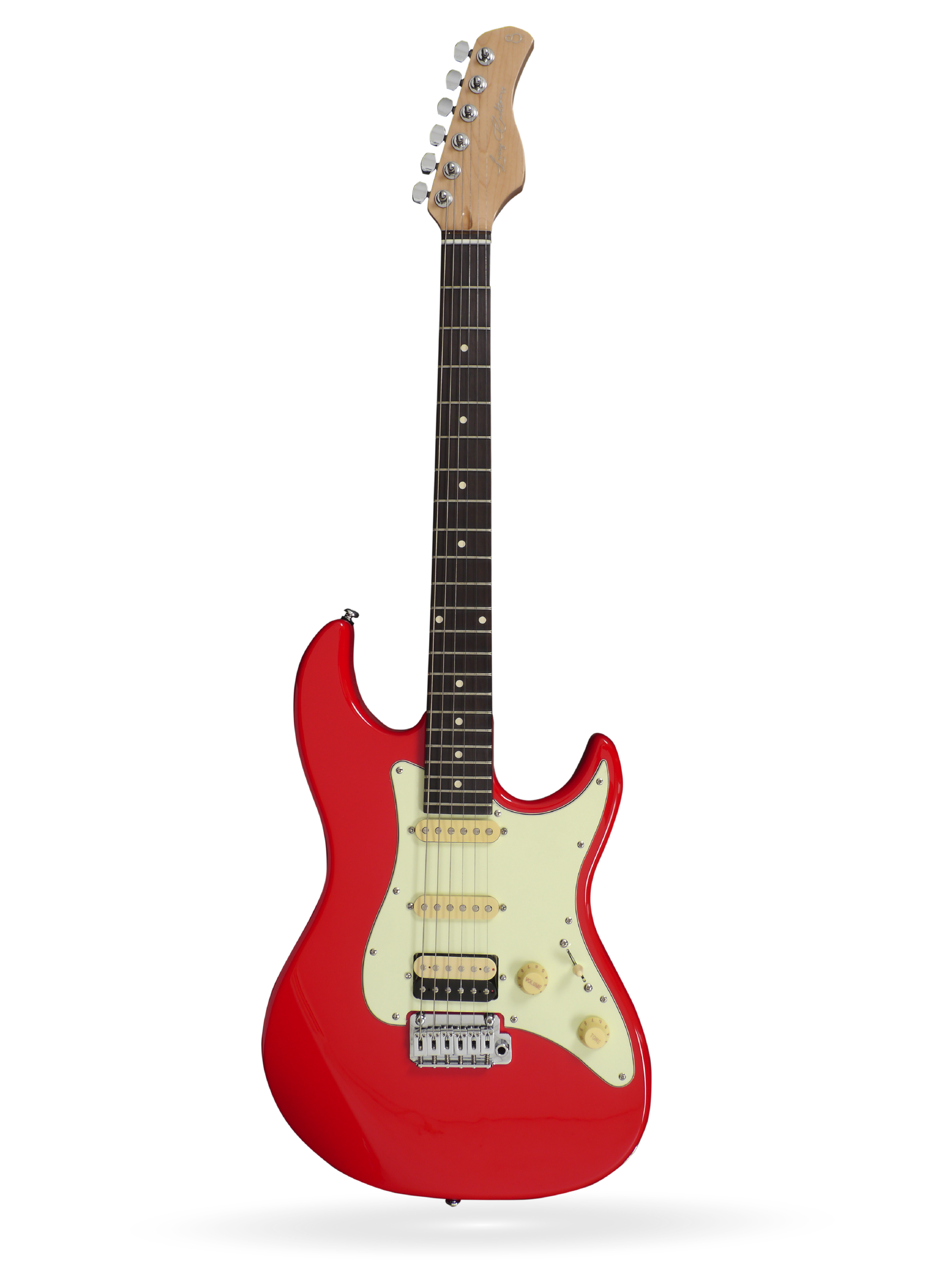An electric guitar is a stringed musical instrument that uses electronic pickups to convert the vibration of its steel-cored strings into electrical signals. These signals often pass through an amplifier to produce sound.
An electric guitar stands as a cornerstone in the world of modern music, shaping genres like rock, blues, and pop with its distinctive sounds. Unlike acoustic guitars, electric guitars require external amplification and typically have solid bodies, which contributes to their unique tone and sustain.
With myriad customization options, from the type of pickups used to the shape of the body and neck, players can significantly alter their instrument’s sound and playability. The electric guitar has been celebrated for its versatility and has become an icon of personal expression for musicians around the globe. Precision in craftsmanship and advances in technology continually enhance its performance and recording potential, further securing its place in musical history.

Credit: www.walmart.com
Introduction To Electric Guitars
The electric guitar stands as a pillar of modern music, electrifying audiences with its magnetic charm and sonic versatility. From its inception, the electric guitar has shaped the soundscapes of countless genres, becoming an emblem of cultural expression. It’s more than a musical instrument; it’s a symbol of innovation, an artist’s ally, and a gateway to creative exploration.
The Evolution Of The Electric Guitar
The journey of the electric guitar is a testament to human ingenuity and the relentless pursuit of musical evolution. The transformation from rudimentary electrified acoustic guitars to today’s sophisticated models is a tale ripe with innovation. The timeline of the electric guitar reflects not just changes in technology but also shifts in musical tastes, artist’s demands, and audience expectations.
Electric Versus Acoustic Guitars: Understanding The Differences
While they share a basic shape and structure, electric and acoustic guitars are distinct entities, each carving their unique niche in the world of music. The electric guitar, with its dependence on electronic amplification, allows for a vast array of sounds and effects. By contrast, acoustic guitars produce sound acoustically, offering a warmer, more natural tone that resonates in the absence of external amplification. These differences affect not only the music produced but also the playing style and techniques employed by guitarists.
Popular Genres And Artists Associated With Electric Guitars
- Rock: Perhaps no other genre is as synonymous with electric guitars as rock. Guitar legends like Jimi Hendrix, Eric Clapton, and Jimmy Page have become nearly inseparable from their instruments.
- Blues: The soulful wails of a blues guitar have a storied history, with icons like B.B. King and Muddy Waters at the forefront.
- Metal: Heavy metal elevated the electric guitar to new heights with breathtaking solos and aggressive power chords, thanks to pioneers like Tony Iommi and Kirk Hammett.
- Jazz: Electric guitars brought a new dimension to jazz, allowing artists like Wes Montgomery and George Benson to explore new sonic territories.
Considering An Electric Guitar Purchase
Embarking on the journey to purchase an electric guitar can electrify the soul of any musician. The right six-string becomes an extension of one’s musical ambition. Whether you’re stepping on stage for the first time or you’re a seasoned artist adding to your collection, understanding the factors involved in selecting an electric guitar is crucial for making an informed decision that resonates with your music and your budget.
Factors To Consider Before Buying An Electric Guitar
The decision to buy an electric guitar entails more than just an admiration for its sleek body or its association with rock and roll legends. Several critical aspects demand your attention:
- Playability: It’s essential for the guitar to feel comfortable in your hands; assess the neck shape and the string action.
- Sound Quality: Test different guitars to find the one that produces your desired tone.
- Aesthetics: Your instrument should inspire you each time you look at it; choose a design that suits your style.
- Electronics and Hardware: Consider the quality of pickups, tuners, and bridge, as they affect sound and tuning stability.
- Future Upgrades: If you plan to upgrade parts in the future, consider the potential cost and compatibility.
Price Ranges And What They Offer
Guitars come in a wide array of prices, each suited to different needs and budgets:
| Price Range | Features | Target Player Level |
|---|---|---|
| Under $200 | Basic features, good for beginners. | Novice |
| $200 – $500 | Better craftsmanship, reliable for serious learners. | Intermediate |
| $500 – $1,000 | High-quality materials, suitable for experienced players. | Advanced |
| Over $1,000 | Professional grade, customizable options. | Expert |
The Significance Of Brands And Models
Brand reputation and specific guitar models play a significant role in your selection:
- Reputation: Established brands like Fender and Gibson are renowned for quality and resale value.
- Innovation: Some brands are known for pioneering unique features and sounds.
- Model Legacy: Certain models, like the Fender Stratocaster or Gibson Les Paul, have a historic and cultural significance.
- Identify the genres you intend to play and research which brands and models are favored by musicians in those genres.
New Vs. Second-hand Guitars: Pros And Cons
Deciding between a new or a used guitar can shape your playing experience in distinct ways:
- New Guitars:
- – Warranty and pristine condition.
- – Higher cost but peace of mind with performance.
- Second-Hand Guitars:
- – More affordable, allowing access to higher-end models.
- – Potential need for maintenance or restoration.
Take your time to weigh the benefits and drawbacks, considering your personal circumstances and preferences.
Learning To Play The Electric Guitar
Embarking on the journey to learn the electric guitar is a thrilling adventure filled with chords, riffs, and rock stardom dreams. It’s a versatile instrument known for its expressive capabilities and is central to many music genres. Whether you aim to serenade with smooth blues or shake the ground with rock and roll, mastering the electric guitar requires dedication, guidance, and the right resources. Let’s dive into the essentials of learning to play the electric guitar, and set the stage for your musical conquest.
Fundamental Skills For Beginners
Every rock legend started with the basics, and so should you. It’s crucial to build a solid foundation of fundamental skills as you begin.
- Finger placement and picking techniques: Efficient use of your fingers for fretting and picking is key.
- Understanding guitar anatomy: Know your instrument like the back of your hand—from the headstock to the bridge.
- Chord shapes and progressions: Start with major and minor chords, and practice transitioning smoothly between them.
- Scale patterns: Learn pentatonic and major scales to develop finger strength and soloing skills.
- Timing and rhythm: Use a metronome to keep time and play along with songs to refine your rhythmic sense.
Resources For Learning: From Music Schools To Online Tutorials
Access to quality learning material can make all the difference in your guitar-playing journey. Various resources cater to different learning styles and paces.
| Resource Type | Pros | Cons |
|---|---|---|
| Music Schools | Structured learning and feedback from instructors. | May be costly and less flexible in terms of schedule. |
| Private Teachers | Personalized attention and tailored lessons. | Depends on finding the right match for your style and goals. |
| Online Tutorials | Convenient, often free, and a vast array of content. | Requires self-discipline to stay consistent and apply learning. |
Practice Routines And Setting Realistic Goals
A methodical approach to practice can significantly speed up your progress. Establish a regular practice routine and set attainable goals to keep you motivated.
- Create a daily practice schedule, and stick to it.
- Break your practice into segments—warm-up, technique, songs, and improvisation.
- Set weekly goals, like mastering a new chord or perfecting a solo.
- Track your progress and revisit difficult areas consistently.
- Celebrate small victories to stay encouraged.
Joining A Community: How Interacting With Other Players Can Help
Music thrives in community, and so does learning. Engaging with fellow guitar enthusiasts can boost your skills, offer new perspectives, and keep your passion ignited.
- Music Forums: Share experiences, get answers to questions, and connect with others on the same musical journey.
- Local Jam Sessions: Playing with others can be fun and educational, exposing you to new techniques and styles.
- Online Groups: Social media groups and online communities can provide support, resources, and collaboration opportunities.
- Live Workshops and Clinics: These events are perfect for learning from seasoned professionals and networking.
Maintenance And Upkeep Of Electric Guitars
Maintenance and Upkeep of Electric Guitars is essential for any guitar enthusiast looking to ensure their instrument sounds its best and lasts a lifetime. A well-maintained guitar not only maintains its tone but also its playability and value. Whether you’re a seasoned musician or just starting, understanding the basics of electric guitar maintenance can save you time and money while enhancing your playing experience.
Routine Maintenance Tasks For Electric Guitar Owners
- Cleaning: Wipe down your guitar regularly with a soft, dry cloth to remove fingerprints and dust. For a deeper clean, use specialized guitar cleaning products.
- String Changing: Replace your strings every 3 to 4 months or when they start to sound dull. Always stretch new strings to prevent tuning issues.
- Fretboard Conditioning: Condition the fretboard with the appropriate oil once a year to prevent drying and cracking.
- Hardware Check: Tighten loose screws and tuners, and check your input jack to avoid any connection issues.
- Humidity Control: Keep your guitar in a controlled environment, as extreme humidity or dryness can damage the wood.
Common Repairs And When To Seek Professional Help
Some repairs can be managed at home, such as restringing your guitar or tightening hardware. However, other issues may require a professional touch:
- Electronics Issue: If you experience buzzing or lack of sound, a professional can diagnose and fix wiring problems.
- Neck Adjustment: A warped or bowed neck affects playability and should be corrected by an expert.
- Fret Work: Worn or uneven frets can cause buzzing and intonation issues, best addressed by a luthier.
Don’t hesitate to consult with a professional when you are uncertain about a repair. They have the expertise to avoid further damage to your instrument.
Customizing And Upgrading Your Guitar
Personalizing your electric guitar not only makes it more enjoyable to play but also tailored to your unique sound:
- Pickups: Swapping out pickups can dramatically change your guitar’s tone.
- Hardware Upgrades: Higher quality tuners, bridges, and nuts can improve tuning stability and resonance.
- Aesthetics: Custom knobs, pickguards, and finishes can give your guitar a unique look.
Before customizing, consider the impact on the instrument’s resale value and ensure upgrades are reversible.
The Longevity Of Electric Guitars And Preserving Their Value
Guitars can last decades if properly cared for. To preserve your guitar’s longevity and value:
- Store Properly: Use a quality case or hang your guitar on a stand away from direct sunlight.
- Regular Check-Ups: Just like a car, a guitar benefits from regular professional setups to maintain its best condition.
- Avoid Modifications: Non-reversible changes can decrease your guitar’s value. Consider this before modifying.
- Document Repairs: Keep a record of all professional repairs and upgrades for future reference or potential buyers.
Bold the key takeaway: a well-maintained electric guitar delivers exceptional performance and retains its value over time.
The Impact Of Electric Guitars On Music And Culture
From the smoky bars of the early 20th century to the dazzling stages of today’s rock concerts, the electric guitar has been a pivotal force in shaping modern music and culture. Its strings have reverberated through time, altering the very essence of musical expression and societal norms. The electric guitar hasn’t just played tunes; it’s played a role in historical movements, inspired generational anthems, and become an emblem of identity for countless music enthusiasts.
Historical Milestones In Electric Guitar Music
The journey of the electric guitar is marked by significant breakthroughs that revolutionized the sound and popularity of music worldwide. A spectacle of innovation, its historical milestones reflect a continuous quest for greater expression.
- 1931: The creation of the Rickenbacker “Frying Pan”, the first commercially successful electric guitar.
- 1940s and 1950s: The electric guitar finds its footing in blues, with artists like Muddy Waters electrifying the genre.
- 1960s: A paradigm shift occurs with the British Invasion, bringing bands like The Beatles and The Rolling Stones to the forefront, wielding electric guitars.
- 1970s: The age of innovation with the development of effects pedals, multi-track recording, and new playing techniques.
Electric Guitars As Symbols Of Youth And Rebellion
The electric guitar strikes a chord with the young, embodying their spirit of defiance and the thirst for change. It’s been brandished by artists who were the voice of youth culture—a symbol of rebellion against the status quo.
Names like Bob Dylan and Chuck Berry are synonymous with these revolutionary ideals, as they plucked and strummed their way into the hearts of a generation seeking transformation.
The Electric Guitar’s Role In Shaping Music Genres
The electric guitar is not just an instrument; it’s a genre-defining titan. Its powerful influence has been instrumental in the birth and growth of multiple music styles.
- Rock ‘n’ Roll: Artists like Elvis Presley brought the electric guitar to the masses, defining the genre’s core.
- Heavy Metal: Bands like Black Sabbath and Metallica pushed the boundaries of sound with aggressive riffs and virtuosic solos.
- Punk Rock: The minimalist, yet potent, approach of bands like The Ramones furthered the instrument’s rebellious image.
- Alternative: The varied textures and atmospheric sounds created by bands like R.E.M. and Nirvana showcased the guitar’s versatility.
Iconic Moments And Performances In Electric Guitar History
Electric guitar history is dotted with performances that have not only defined careers but also eras. Here are a few that left an indelible mark on music and its fans:
- Jim Hendrix’s incendiary rendition of “The Star-Spangled Banner” at Woodstock ’69.
- The Queen performance at Live Aid in 1985, cementing Freddie Mercury and Brian May’s legacy.
- Slash’s solo in Guns N’ Roses’ “November Rain”—a cinematic masterpiece that resonates with many.
- The defining LED Zeppelin performance of “Stairway to Heaven” live, with Jimmy Page’s unforgettable double-neck guitar.

Credit: www.sweetwater.com

Credit: sire-usa.com
Is the Type of Electric Guitar Important When Choosing Cables?
Choosing the right cables for your electric guitar hinges on understanding electric guitar cable compatibility. Different types of guitars produce varying signals, requiring specific cable types to ensure optimal sound quality. A mismatch can lead to unwanted noise or reduced tone clarity, making compatibility a key factor in your setup.
Frequently Asked Questions On Is An Electric Guitar
Is An Electric Guitar Good For Beginners?
An electric guitar can be a good choice for beginners due to its thin neck, light strings, and easy playability. It often requires less finger strength than acoustic guitars, making initial learning more comfortable.
Is An Electric Guitar Easier Than An Acoustic?
An electric guitar can be easier due to lighter strings and a thinner neck, which facilitate learning and playing for beginners.
Are Electric Guitars Hard To Play?
Electric guitars are not inherently hard to play. Beginners may face challenges with techniques and finger strength, but consistent practice leads to improvement. Their playability also depends on the guitar setup and individual comfort.
Is Electric Guitar Same As Guitar?
An electric guitar incorporates electronic amplification, differing from acoustic guitars which do not require external amplification. Both are types of guitars, yet they produce distinct sound qualities.
Conclusion
Exploring the realm of electric guitars reveals their transformative impact on music. Whether a seasoned player or a curious beginner, the versatility of an electric guitar caters to all. Embrace the journey and let the strings chart your unique sonic adventure.
Dive into the electric experience and let creativity soar.
{ “@context”: “https://schema.org”, “@type”: “FAQPage”, “mainEntity”: [ { “@type”: “Question”, “name”: “Is An electric guitar good for beginners?”, “acceptedAnswer”: { “@type”: “Answer”, “text”: “An electric guitar can be a good choice for beginners due to its thin neck, light strings, and easy playability. It often requires less finger strength than acoustic guitars, making initial learning more comfortable.” } } , { “@type”: “Question”, “name”: “Is an electric guitar easier than an acoustic?”, “acceptedAnswer”: { “@type”: “Answer”, “text”: “An electric guitar can be easier due to lighter strings and a thinner neck, which facilitate learning and playing for beginners.” } } , { “@type”: “Question”, “name”: “Are electric guitars hard to play?”, “acceptedAnswer”: { “@type”: “Answer”, “text”: “Electric guitars are not inherently hard to play. Beginners may face challenges with techniques and finger strength, but consistent practice leads to improvement. Their playability also depends on the guitar setup and individual comfort.” } } , { “@type”: “Question”, “name”: “Is electric guitar same as guitar?”, “acceptedAnswer”: { “@type”: “Answer”, “text”: “An electric guitar incorporates electronic amplification, differing from acoustic guitars which do not require external amplification. Both are types of guitars, yet they produce distinct sound qualities.” } } ] }As an Amazon Associate, Cleanestor earns from qualifying purchases at no additional cost to you.

